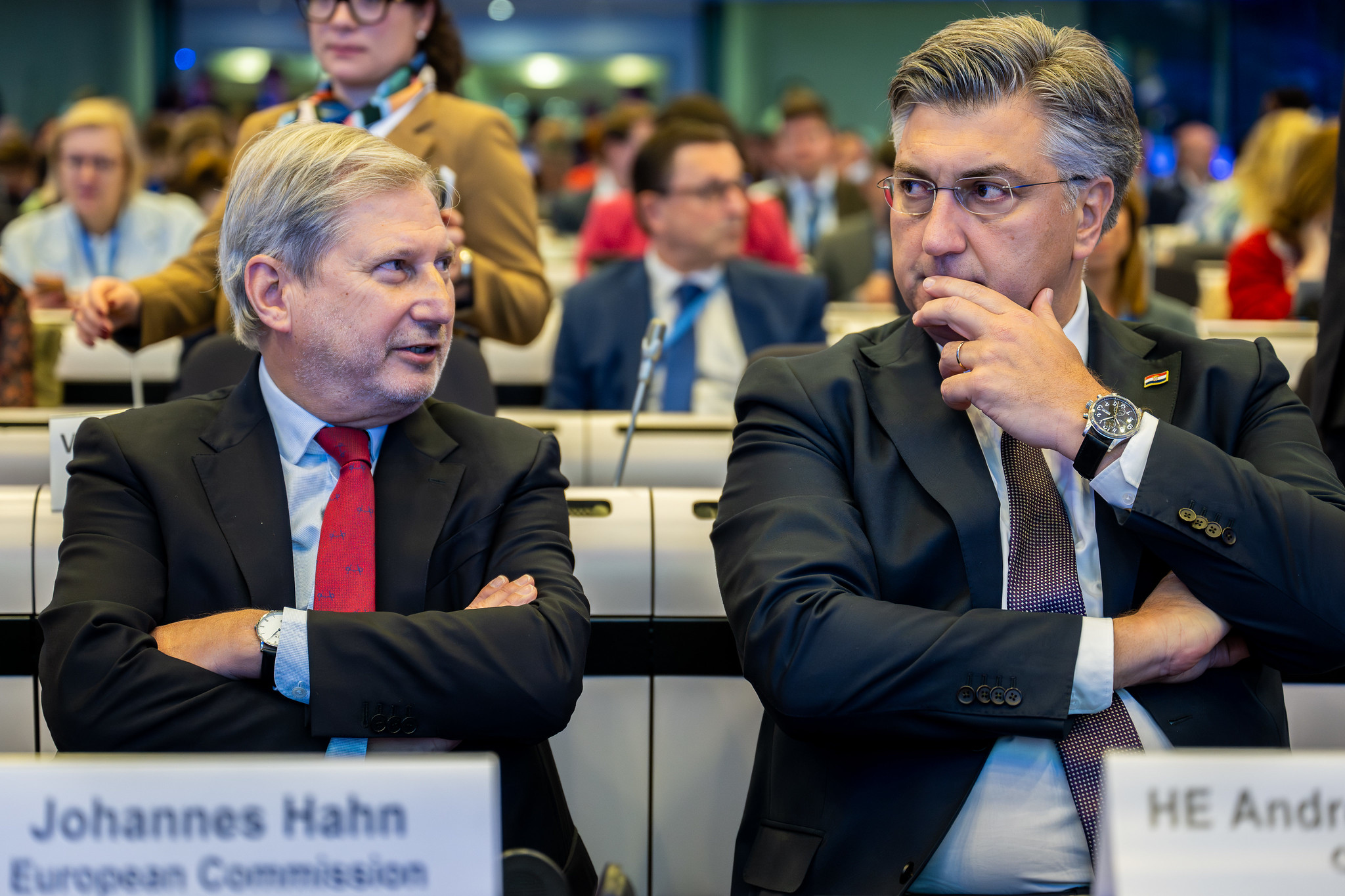 The European Union (EU) is gearing up for an intense battle over its finances as it prepares to negotiate its next seven-year budget, known as the Multiannual Financial Framework (MFF). This process, set to commence earnestly by 2025, will shape the bloc's spending priorities and revenue sources for the period of 2028-2034. The stakes are high as the EU faces a confluence of daunting challenges that will test its unity and resolve.
The European Union (EU) is gearing up for an intense battle over its finances as it prepares to negotiate its next seven-year budget, known as the Multiannual Financial Framework (MFF). This process, set to commence earnestly by 2025, will shape the bloc's spending priorities and revenue sources for the period of 2028-2034. The stakes are high as the EU faces a confluence of daunting challenges that will test its unity and resolve.
EU Budget 2024: A Wake-Up Call, But to What?
Every year, the EU institutions hold a special conference to take stock of the EU economy: risks taken, successes achieved, and the projected challenges the Union will face in the coming period. This year's event highlighted inescapable truths. The EU finds itself at a crossroads, with knowledge and expertise abound to face these challenges, but questions linger about bureaucratic institutions' ability to navigate hurdles in time to mitigate risks and existential threats to European prosperity and global influence. This urgency reflects the EU’s past intransigence when expecting other nations to respect its regulation, as rapid rises in both domestic and foreign investment by the US and China challenge European dominance in research and innovation.
Shifting Towards a War Economy
One central theme from was the need for the EU to transition towards a war economy. As Johannes Hahn, European Commissioner for Budget and Administration, emphasised, 'business as usual is no longer an option' in the face of growing geopolitical tensions and security threats. Russia's invasion of Ukraine has underscored the urgency for the EU to bolster its defense capabilities and reduce its reliance on the United States for security. Hahn stressed that the future MFF must prioritize investments in common defense capabilities, including massive procurement of military equipment through joint initiatives. This shift towards a more assertive posture is driven by the recognition that European security is 'inseparable' and can no longer be left primarily in American hands.
Budget Simplification
The Commission wants to change the way it pays out money to its member states from their common budget, which budget commissioner Johannes Hahn yesterday said was 'not fit for the future.’ As the EU gears up to negotiate its next seven-year budget, there is a growing emphasis on simplifying the rules and procedures governing access to EU funding. The current Financial Regulation, which took effect in August 2018, introduced several measures aimed at streamlining the process and ensuring better protection, efficiency, and transparency, including reduced information requirements, increased use of lump-sum payments, improved cooperation, and reduced duplication, and continuing to leverage new financial instruments.
The Letta Report
Former Italian Prime Minister Enrico Letta’s report assessing the future of the EU's single market was the reference of the hour and deserves its own section. Along with what is expected in June’s expected Draghi report, Letta has continued to highlight the need for the single market to evolve and adapt to a rapidly changing global landscape, where the EU's economic weight is diminishing and competitors are increasingly willing to bend or break the established rules. Letta was in near universal agreement with other panel attendees, stating, ‘The problem is that we [the EU] are too small. If we don’t integrate, we will decline.’ However, while acknowledging many pressing issues, such as the need for high-speed rail, investments in space technology, and a more unified health sector, the report has been criticized for echoing previously raised ideas and glossing over trade-offs. This could spotlight many of the ailments facing the EU: can it make necessary adjustments with 27 equal players involved.
The EIB and scaling up
Nadia Calviño, the newly appointed President of the European Investment Bank (EIB), has called on EU member states to scrap the outdated 2.5 times 'subscribed capital' lending cap currently imposed on the development bank. This rule, dating back to the 1950s, constrains the EIB's ability to provide more funding for the EU's key priorities, such as climate change, rebuilding Ukraine, and bolstering Europe's defense industry. As the EU's lending arm, the EIB plays a crucial role in financing projects that align with the bloc's strategic objectives. Calviño expressed confidence that the member states will remove the lending cap at the EIB's annual meeting in June, allowing the bank to increase its investments without impacting taxpayers while maintaining its triple-A credit rating and avoiding costly capital injections.
Enlargement and Neighborhood Integration
Another key priority for the next MFF will be supporting the EU's enlargement agenda and deeper integration with its immediate neighbors. Commissioner Hahn expressed confidence that the accession of Ukraine, Moldova, and the Western Balkans will be 'manageable from a budget point of view,' despite concerns about the associated costs. Facilitating the integration of these countries is seen as essential for deepening the EU's collective security, democracy, and prosperity. However, as Hahn acknowledged, overcoming political obstacles may require more political will than financial resources.
Bolstering Competitiveness and Strategic Autonomy
Recognizing the increasingly competitive global environment, the EU is also determined to strengthen its economic competitiveness and achieve greater strategic autonomy. Hahn highlighted the need to direct EU investments towards critical projects in biotechnology, digital technologies, and clean energy through initiatives like the Strategic Technologies for Europe Platform (STEP). The future MFF will aim to leverage the EU's collective strength to enhance its industrial base, reduce strategic dependencies, and foster innovation. Joint procurement efforts, particularly in the defense sector, are seen as a way to achieve more with the same financial resources.
Addressing Climate Change and Energy Security
Climate change and energy security represent another urgent challenge that the EU must tackle collectively. As Managing Director of the International Monetary Fund (IMF) Kristalina Georgieva emphasized, the EU's climate and energy security objectives are 'fully complementary', and Georgieva advocated for a strong, coordinated EU role in surging public and private investments towards the most cost-effective emission reduction measures. This includes promoting cross-border investments in electricity grids, research and development in clean technologies, and ensuring a level playing field within the single market.
Reforming Revenue Sources and Budgetary Mechanisms
To address these multifaceted challenges, the EU recognizes the need for fundamental reforms to its revenue sources and budgetary mechanisms. Commissioner Hahn highlighted three key dimensions: spending, revenue, and impact. On the revenue side, the EU is exploring innovative financing options beyond the traditional reliance on member states' contributions based on Gross National Income (GNI). Proposals include introducing new own resources linked to EU policies, such as auctions of emissions allowances, a Carbon Border Adjustment Mechanism (CBAM), and levies on multinational corporations' profits. Additionally, the EU is considering tapping into joint debt issuance, following the successful example of the NextGenerationEU recovery fund. This would provide additional financial firepower while enhancing the EU's credibility as a bond issuer. Regarding expenditure, Hahn emphasized the need for greater flexibility and agility in the MFF's structure. The current system, with its pre-allocations and limited flexibility, has proven inadequate in responding to unforeseen challenges like the Ukraine war and the energy crisis. Mid-term reviews and top-ups may become regular instruments to adapt to changing realities.
Overcoming Political Divisions and Institutional Challenges
While the EU's ambitions for the next MFF are significant, the path to reaching an agreement will be arduous. Political divisions among member states, particularly between fiscally conservative "frugal" countries and those advocating for increased spending, will be a major obstacle. The potential introduction of new EU-wide taxes and debt issuance mechanisms faces opposition from some nations wary of ceding fiscal sovereignty to Brussels. The departure of long-serving leaders like Angela Merkel, who brokered complex compromises, adds to the challenge. Moreover, the outcome of the 2024 European Parliament elections, which could deliver a rightward shift, will be a crucial factor, as the Parliament holds a veto over the budget.
Forging Unity through the Budget
Despite these formidable challenges, the EU recognizes the budget as a powerful tool for forging unity and collective action. As Commissioner Hahn eloquently stated, 'the budget is politics cast in figures.' By aligning spending priorities with the bloc's strategic objectives, the MFF can serve as a catalyst for deeper integration and cohesion. Initiatives like the Recovery and Resilience Facility have demonstrated the transformative power of performance-based funding in incentivizing reforms and investments across member states.
The Elephant in the Room
The EU may also be facing an identity crisis. Everything heard from the event highlighted the need for further private investment and hailing the work of the EIB. However, the trade-offs, as mentioned before, typically included the need for both simplification and deregulation. I would argue these concepts come with caveats, in the form of sacrificing an EU identity that works towards justice, social rights, and quality of life – something that the EU certainly leads in, and defines where most us want to continue to be. The question is how this can be balanced with the pressing economic and competition needs the EU will face as part of 2028’s recodification of what it means to be a European global economy. After all, when the last MFF was penned, we couldn't possibly have fathomed a two-year pandemic - or a war within Europe's borders - adding to the very real challenges the EU was already facing.






